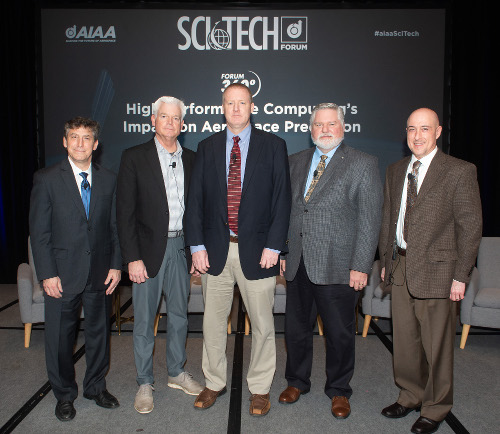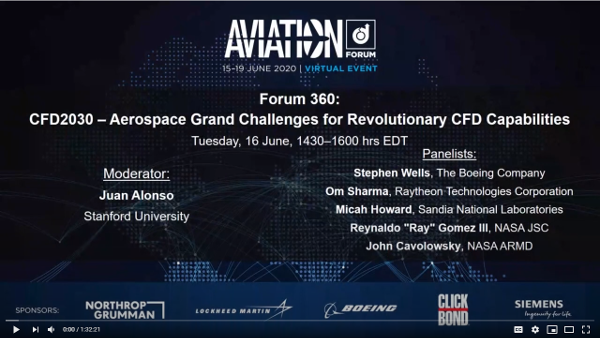CFD 2030 IC News & Events
In the course of executing its mission to advocate for and foster the CFD 2030 Vision, the Integration Committee will host or sponsor various events.
2022
AIAA SciTech, January
See the full SciTech agenda at virtualscitech.aiaa.org.
Technical Paper Session: NASA's Revolutionary Computational Aerosciences (CFD2030-01/FD-50)
Wed 05 Jan, 14:00 - 15:40, In Person
List of papers:
- A 20-year Vision for Flight and Engine Certification by Analysis
- A Comparative Assessment of Computational Methodologies for Prediction of CLmax on the High-Lift Common Research Model
- WMLES of Turbulent Flows using FUN3D
- Large Eddy Simulation of the NASA High-Lift Common Research Model
- Ongoing Aeroelastic prediction and Validation Activities at NASA Langley Research Center
Technical Panel: Impact of AIAA Sponsored Workshops on the CFD 2030 Vision I (CFD2030-02)
Thu 06 Jan, 14:00 - 15:40, In Person
Abstract:
This session will consist of brief descriptions of the long term objectives of various AIAA-sponsored workshops and host a panel discussion on potential synergies between workshop agendas and the CFD 2030 Vision including the recently proposed CFD 2030 Grand Challenge Problems.
Technical Panel: Impact of AIAA Sponsored Workshops on the CFD 2030 Vision II (CFD2030-03)
Thu 06 Jan, 16:00 - 17:40, In Person
Abstract:
This session will consist of brief descriptions of the long term objectives of various AIAA-sponsored workshops and host a panel discussion on potential synergies between workshop agendas and the CFD 2030 Vision including the recently proposed CFD 2030 Grand Challenge Problems.
2021
AIAA Aviation, August
Technical Panel: The Impact of Physical Modeling on CFD Capabilities
Abstract:
Advances in high performance computing capabilities have enabled higher resolution simulations that significantly reduce the numerical errors associated with the application of CFD to aerospace design. Increased computing capacity enables expanded use of scale resolving turbulent simulation methods as well as higher fidelity models of combustion and transition to turbulence. Currently, the large number of simulations required for conceptual design, detailed design, and certification preclude the use of wall resolved large eddy simulation (LES) for the bulk of CFD applications related to product development. Despite improvements enabled by increased computational power, errors associated with physical modeling of transition, turbulence and combustion processes remain an obstacle to rapidly accelerating the use of CFD to reduce design cycle duration and development testing requirements. The lack of accurate, robust, and automated methods for prediction of transition remains a challenge, particularly for vehicles designed for use with significant extents of laminar flow. Models employed to account for the effects of turbulence including RANS, hybrid RANS-LES and wall modeled LES each have unique accuracy limitations relative to wall resolved LES and test derived data. In addition, they each have very different computational requirements. A particularly challenging problem is quantification of physical model uncertainty for vehicles without extensive existing test data. To realize the CFD 2030 Vision, significant advances in both accuracy and computational efficiency of physical modeling approaches are required. This panel will discuss the critical physical modeling issues that need to be addressed and potential solutions to enable the virtual model-based engineering design paradigm.
Panelists:
- Brian Smith (Lockheed Martin) – Moderator
- Florian Menter (ANSYS, Inc.)
- Oriol Lehmkuhl (Barcelona Supercomputing Center)
- Venkat Raman (University of Michigan Ann Arbor)
- Meelan Choudhari (NASA-Langley Research Center)
Technical Paper: CFD Vision 2030 Road Map: Progress and Perspectives
- Link to paper download from Aerospace Research Central: AIAA 2021-2726
- Cary, A., Chawner, J., Duque, E., Gropp, W., Kleb, W., Kolonay, R., Nielsen, E., and Smith, B., "CFD Vision 2030 Road Map: Progress and Perspectives," AIAA paper no. 2021-2726, Aug 2021, https://doi.org/10.2514/6.2021-2726.
Abstract:
The CFD Vision 2030 Study, contracted by NASA, was published in 2014 and has become an aspirational objective for focusing CFD development on aerospace applications. The Study identified six main technical domains for aligning research: high performance computing (HPC), physical modeling, algorithms, geometry and grid generation, knowledge extraction, and multi-disciplinary analysis and optimization (MDAO). Within each domain, sub-disciplines (aka elements) illustrate the maturation of technology during the time period from 2015 to 2030. Each of the elements have their own timeline to identify key technology milestones and technology demonstrations. This Roadmap provides a compact and informative summary of future objectives and milestones, but some details are necessarily omitted from the graphic due to space constraints. These maturing technologies target the use of CFD for aerospace applications of increasing complexity which are represented in the Study by a series of grand challenge problems. At the 2019 AIAA Aviation forum, five years after the Study was published, a special session was held with invited lectures reviewing the progress and future in the six domains. Recognizing the ongoing utility of the Vision toward improving CFD technology, AIAA formed the CFD 2030 Integration Committee (IC). One of the charters of the IC is to maintain the Roadmap by assessing progress and highlighting the ongoing needs of aerospace CFD. Shortly after the 2019 Aviation Forum special session, the IC formed a Roadmap subcommittee to provide a detailed technical review of the Roadmap and identify progress with (and challenges to) following the outlined trajectory. The Roadmap subcommittee released a report in June of 2021 with their findings to provide further guidance to the research community. While this report cannot be exhaustive and there are likely some elements omitted or inadvertently neglected, it represents inputs from a diverse group of experts in the field. This paper describes the approach taken, summarizes the findings, and provides an update to the Vision 2030 Roadmap reflecting the present understanding.
Authors:
- Andrew Cary (The Boeing Company)
- John Chawner (Pointwise)
- Earl Duque (Intelligent Light)
- William Gropp (Univ. of Illinois, Urbana-Champaign)
- William Kleb (NASA Langley Research Center)
- Raymond Kolonay (Air Force Research Laboratory)
- Eric Nielsen (NASA Langley Research Center)
- Brian Smith (Lockheed Martin Corp.)
Symposium on Industrial Applications of IGA at the 16th U.S. National Congress on Computational Mechanics, July
Invited Presentation: Mesh Generation and NASA's CFD Vision 2030
JSASS/JAXA 53rd Fluid Dynamics Conference and 39th Aerospace Numerical Simulation Symposium, June
Invited Presentation: Advancing CFD Vision 2030: Progress and Future Plans within the Aerospace Community
AIAA SciTech, January
CFD 2030 Grand Challenge Problems for Numerical Simulation in Aerospace Engineering
The CFD 2030 Integration Committee held a special session of invited talks for “Defining Grand Challenge Problems for the CFD 2030 Vision.” The CFD 2030 Vision report laid out a bold vision for future computational capabilities and their potential impact on aerospace engineering and design. In the report, a series of four Grand Challenge (GC) problems were suggested in order to demonstrate the potential impact that advanced computational capabilities will have on aerospace engineering. In this session, more detailed formulations of a small number of GC problems will be proposed by experts in the field. Additionally, the potential of these GC problems in advancing the state-of-the-art as well as for serving as a benchmark of technological progress will be discussed.
-
A Grand Challenge for the Advancement of Numerical Prediction of
High Lift Aerodynamics
by Jeffrey Slotnick and Dimitri Mavriplis
Presentation Slides
Full Paper -
CFD 2030 Grand Challenge: CFD-in-the-Loop Monte Carlo Flight
Simulation for Space Vehicle Design
by David Schuster
Presentation Slides
Full Paper -
Vision 2030 Aircraft Propulsion Grand Challenge Problem: Full-engine
CFD Simulations with High Geometric Fidelity and Physics Accuracy
by M. Anand, Gregory Laskowski, Kenneth Suder, Gorazd Medic, Umesh Paliath, and Mujeeb Malik
Presentation Slides
Full Paper
CFD 2030 Grand Challenge Problem Panel Discussion
The three technical paper authors from the previous session were joined by the following three invited experts to serve on the panel.
-
Michelle Munk,
Principal Technologist for Entry, Descent and Landing,
NASA Space Technology Mission Directorate
Introductory Slides -
Robert Meakin,
CREATE Project Manager,
U.S. Dept. of Defense
Introductory Slides -
Doug Kothe,
Director of Exascale Computing Project,
Oak Ridge National Lab
Introductory Slides
2020
AIAA Year in Review, December
AIAA Aviation, June
Forum 360: Aerospace Grand Challenge Problems for Revolutionary CFD Capabilities
Abstract:
The Aerospace industry requires significantly enhanced computational analysis methods and tools to enable improved performance, reduce product development risk, and enhance system safety for future air and space vehicles. As outlined in the Computational Fluid Dynamics (CFD) Vision 2030 report published in 2014, grand challenge (GC) problems drive the identification and solution of the critical CFD barriers that would lead to a desired revolutionary CFD capability. For this purpose, several GC problems have been formulated to focus community attention and resources to address critical shortcomings in CFD predictive capability in key product and system categories. In this panel, a brief summary of each of four GC problems will be initially discussed, highlighting key technical obstacles and the quantified benefit to industrial product development in overcoming those obstacles. Panelists will then provide expert opinion on the design, execution, and importance of GC problems, and effective ways to engage the science and engineering communities to efficiently tackle these long-term focus problems.
Watch the recording of this event by clicking here or on the image below.
Panelists:
Juan Alonso (Moderator)
Professor, Stanford University. Director – Aerospace Design Lab
slides: CFD 2030 Aerospace Grand Challenges for Revolutionary CFD Capabilities
John Cavolowsky
Director of Transformational Aeronautics Concepts, NASA
slides: NASA and the CFD Vision 2030
Ray Gomez
Aerodynamics Technical Discipline Lead, NASA Johnson Space Center
slides: CFD-in-the-Loop Monte-Carlo Flight Simulation for Space Vehicle Design
Micah Howard
Principal Member of Technical Staff, Sandia National Laboratories
slides: A DOE Perspective on Hypersonics Grand Challenges
Om Sharma
Senior Fellow, United Technologies Research Center
slides: Full Engine Simulation
Steve Wells
Director – Flight Sciences, Boeing Commercial Airplanes
slides: Boeing Perspective on the CFD Grand Challenges
AIAA SciTech, January
Forum 360: High Performance Computing's Impact on Aerospace Prediction
On Thursday 09 January at 2:00 p.m., the CFD 2030 IC hosted a Forum 360 panel discussion on HPC as it relates to the CFD 2030 Vision.
Here are the integrated slides (PDF) from all the presenters.
Here is a link to the 2-hour video recording of the discussion on AIAA's website (FYI: The video will autoplay).
- Jeffrey Slotnick, Technical Fellow - Flight Sciences, Boeing Commercial Airplanes (Moderator)
- Roy Campbell, Chief Scientist, HPCMP, DoD
- Douglas Kothe, Director, Exascale Computing Project, Oak Ridge National Lab
- Eric Nielsen, Research Scientist, Computational Aerosciences, NASA Langley
- Scott Morton, DoD HPCMP CREATE-AV Project Manager, U.S. Army Engineering Research and Development Center

2019
AIAA Year in Review, December
AIAA Aviation, June
Special session on five years of progress toward the Vision.
-
John Cavolowsky: NASA Aeronautics and CFD 2030
- Oral presentation only
-
Jeff Slotnick: Progress Towards CFD Vision 2030 – An Industrial
Perspective for Air and Space Vehicle Applications
- Presentation Slides (PDF)
-
Gorazd Medic: Impact of Vision 2030 on CFD Practices in Propulsion Industry
- Presentation Slides (PDF)
- Full paper = AIAA 2019-2943 (available from AIAA)
-
Eric Nielsen: High Performance Computing Towards CFD Vision 2030
- Oral presentation only
-
Dimitri Mavriplis: Progress in CFD Discretizations, Algorithms and
Solvers for Aerodynamic Flows
- Presentation Slides (PDF)
- Full paper = AIAA 2019-2944 (available from AIAA)
-
John Chawner and Nigel Taylor: Progress in Geometry Modeling and Mesh
Generation Toward the CFD Vision 2030
- Presentation Slides (PDF)
- Full paper = AIAA 2019-2945 (available from AIAA)
-
Philippe Spalart and Michael Strelets: Turbulence Prediction in Aerospace
CFD: Reality and the Vision 2030 Roadmap
- Presentation Slides (PDF)
2018
AIAA Year in Review, December
AIAA SciTech, January
-
Future CFD Technologies Workshop
Agenda and Presentation Archive
